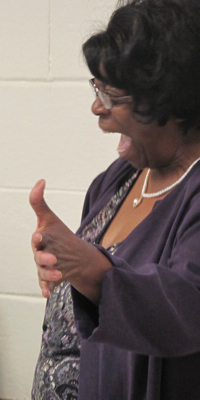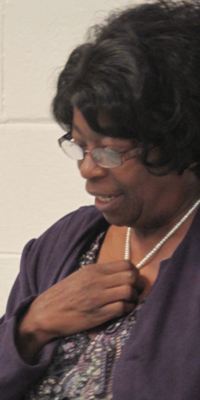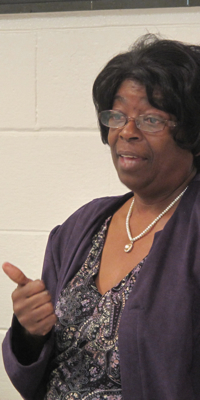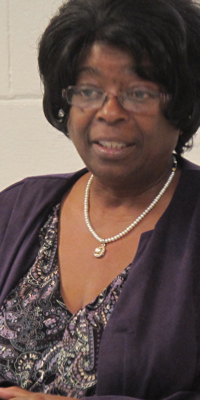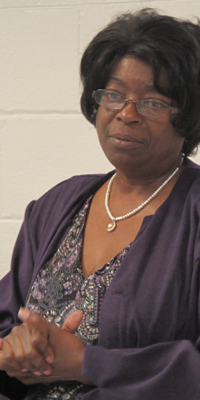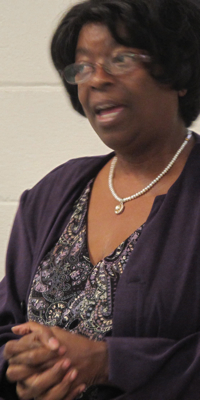
Breakfast
Forum
Charlotte, NC
www.tueforumclt.org
Home ● Where We Meet ● News ● Announcements ● Events ● About Us ● Contact Us ● Search ●

Breakfast
Forum
Charlotte, NC
www.tueforumclt.org
Home ● Where We Meet ● News ● Announcements ● Events ● About Us ● Contact Us ● Search ●
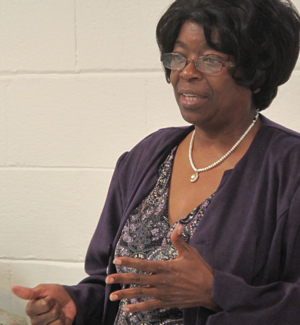 Sickle
cell: An update
Sickle
cell: An update
Nov. 23, 2010
An inherited disease that puts its victims through years of pain affects hundreds of Charlotte residents, says a longtime Charlotte resident heading up efforts to educate the community on sickle cell disease.
Sadie Jordan is program manager at the Charlotte office of Community Health Interventions & Sickle Cell Agency Inc. The agency won a $245,600 state contract for the year ending June 30, 2011 to educate the public on primary care physicians and the value of a medical home, and to provide education and genetic counseling for Sickle Cell Disease and Sickle Cell Trait, diabetes and HIV-AIDS. Other offices serve Cumberland, Robeson, Hoke, and Harnett counties.
Jordan addressed the Forum Nov. 23, demolishing myths, giving information and appealing for those in the community with personal experience of this disease to speak out about it.
Mandatory testing for the disease at birth began in 1985. Based on that information and surveys of people who have moved to Mecklenburg from elsewhere, Jordan estimates that there are more than 600 Mecklenburg residents with the active disease.
But many who have the trait, and therefore could create children with the disease, were never told of their condition, Jordan said. The number of people in the Mecklenburg population with the trait for sickle cell disease is unknown but far larger, she said.
And the silence of the victims, she said, has retarded both research and treatment.
The labeling of the disease as an African-American phenomenon, when in fact it affects all sorts of people, has had equally pernicious results.
Below are audio files from Jordan's visit. Links to additional information on the disease will be placed here as that information becomes available.
Audio from Jordan's visit
Nov. 23, 2010
Initial comments.
The treatment cliff: How children who are identified early and receive treatment for the sickle cell disease during public school lose their medical care at age 18.
The federal 504 protection, useful both during and after school age.
A Forum participant asked about research on use of marijuana to control sickle cell pain.
Asked about why some diseases get lots of research and treatment money and sickle cell has not, Jordan addressed the silence among victims that is a barrier to advances in treatment.
.
The disease's impact on families.
Numbers of Mecklenburg residents affected.
On whether children born prior to 1985 were likely screened for sickle cell by their doctors.
On whether CMS is following U.S. IDEA law requiring school officials who know or should have known about this disabling disease to initiate an Individualized Education Plan to accommodate the disability.
Concluding statement.
'A circle of protection'
As the Forum began, Jordan described what she said was known then as "The Charlotte Family," an informal group of mostly African-American adults who mentored her as a young woman fresh out of law school.
The time was the 1960s, and Jordan was economic development and relocation supervisor of the City of Charlotte as it began purchasing land and removing residents from urban renewal area.
Jordan also was involved in land purchases for airport expansion and the removal of an infamous scrap yard just north of I-277.
In the audio of her comments, Jordan mentions a lot of names. Information on
those people, in the order in which they come up:
Sarah Stevenson: Helped merge the two segregated PTAs; served 8 years on the school board.
Phyllis Lynch: longtime Cherry community activist.
Hubert Smith Fellowship:
Jim Richardson: Retired as Mount Holly postmaster in 1981 after 33 years with the Postal Service. Served as county commissioner and in both N.C. House and N.C. Senate.
Willie Stratford: His name and Richardson's are on a YMCA on West Boulevard.
Charlie Dannelly: Educator and former CMS principal; current N.C. senator.
Julius (Chambers): Lawyer who pursued the Swann vs. Mecklenburg lawsuit that led the U.S. District Court to order CMS to desegregate all schools, using busing if necessary.
J.B. Fennell: City of Charlotte employee who taught Jordan how to "sell the air, sell the sunlight, and sell what's underneath."
E.W. Waddell: Led urban relocation for the city's Urban Renewal Commission.
E.E. Waddell: Principal of Second Ward High School during the 1960s until it was bulldozed for urban renewal, later a CMS executive, retiring in 1982. The school bearing his name opened in 2001.
Vernon Sawyer: Served 26 years beginning in 1959 as Charlotte's director of urban renewal.
Malachi Greene Sr.: Longtime Charlotte contractor.
Fred Alexander: first African-American to serve on Charlotte CIty Council, later served in N.C. General Assembly.
Jim Polk: Helped Mayor Stan Brookshire's restaurant desegregation in 1960s; chaired the city's Bureau on Employment, Placement and Training that helped break down workplace discrimination.
Ken Koontz: Veteran reporter for WBTV News.
Harvey Gantt: Integrated Clemson University; architect who later Charlotte's first African-American mayor.
